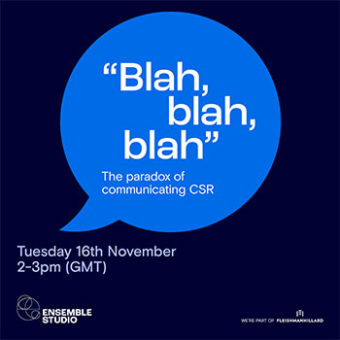The paradox of communicating CSR: True engagement

Many companies try to improve their image by communicating their involvement in socially responsible activities. This often arouses scepticism rather than achieving the intended goal. Greta Thunberg conveyed it most eloquently: “Blah, blah, blah”.
In this series, we explore ways to successfully manage the predicament.
Join us at 2pm (GMT) on Tuesday 16 November 2021 for a webinar on the challenges of building trust with their audiences when communicating CSR.
True engagement
In post 4. ‘Warts and all‘, we turned our attention to the notion of authenticity in today’s hyper-connected world. Let’s now explore the importance of stakeholders for communicating authentically on corporate citizenship.
Communication on corporate citizenship must be thought more broadly and holistically than in the past, and be more integrated with business practices. An important communication strategy that some companies use effectively is stakeholder engagement.
What is important in engaging with a variety of stakeholders is that the messages are consistent, deeply integrated with the business practices of the company and based on authentic values. Truths emerge rapidly in today’s electronically connected society.
When firms start pursuing stakeholder engagement strategies, they need to be self-conscious of the information deemed to be important and be alert that interested parties may request other intelligence.
The outcome may require changes in strategies, conduct and performance. Those who are unwilling to enter in an open and authentic dialogue risk facing push-back from interested parties and negative reputational consequences.
Other ways of stakeholder engagement and communication can be more direct. For example, those investors who are explicitly interested in ESG performance, as well as financial results, may seek to engage companies by filing shareholder resolutions. These provide an opportunity for the executive team to engage in dialogue with investors, find out what their concerns are, and see if a mutually beneficial solution can be negotiated before putting the resolution for a vote.
Stakeholder engagement is a powerful mechanism for developing an in-depth understanding of contextual changes that may be strategically relevant, for providing insights into potential innovations, and for helping the company manage risk.
In post 6. ‘Managing the paradox’, we will bring to a close our series on ‘The paradox of communicating CSR’ with our main takeouts.
Register to attend or CSR Panel on Tuesday 16 November 2021 at 2pm (GMT). A panel of speakers from FleishmanHillard, TotalEnergies, Hargreaves Lansdown, and EY will be comparing real-life experiences on the challenges of building trust with their audiences when communicating CSR.
on Tuesday 16 November 2021 at 2pm (GMT). A panel of speakers from FleishmanHillard, TotalEnergies, Hargreaves Lansdown, and EY will be comparing real-life experiences on the challenges of building trust with their audiences when communicating CSR.
Richard Costa is Director and Head of Corporate Reporting at Ensemble Studio.
Find Out More
-
Achieving Outsized Impact by Building Stronger Country Reputation
February 18, 2025


